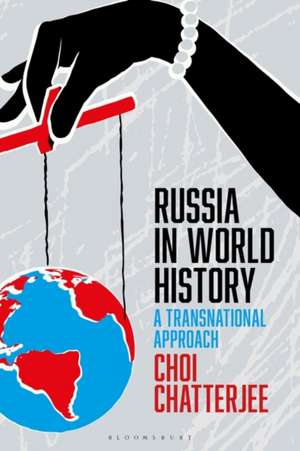Russia in World History: A Transnational Approach
Autor Professor Choi Chatterjeeen Limba Engleză Paperback – 23 feb 2022
| Toate formatele și edițiile | Preț | Express |
|---|---|---|
| Paperback (1) | 148.20 lei 3-5 săpt. | +48.08 lei 4-10 zile |
| Bloomsbury Publishing – 23 feb 2022 | 148.20 lei 3-5 săpt. | +48.08 lei 4-10 zile |
| Hardback (1) | 407.66 lei 3-5 săpt. | +87.85 lei 4-10 zile |
| Bloomsbury Publishing – 23 feb 2022 | 407.66 lei 3-5 săpt. | +87.85 lei 4-10 zile |
Preț: 148.20 lei
Preț vechi: 180.44 lei
-18% Nou
Puncte Express: 222
Preț estimativ în valută:
28.37€ • 30.82$ • 23.84£
28.37€ • 30.82$ • 23.84£
Carte disponibilă
Livrare economică 01-15 aprilie
Livrare express 15-21 martie pentru 58.07 lei
Preluare comenzi: 021 569.72.76
Specificații
ISBN-13: 9781350026414
ISBN-10: 1350026417
Pagini: 240
Ilustrații: 11 bw illus
Dimensiuni: 156 x 234 x 16 mm
Greutate: 0.41 kg
Editura: Bloomsbury Publishing
Colecția Bloomsbury Academic
Locul publicării:London, United Kingdom
ISBN-10: 1350026417
Pagini: 240
Ilustrații: 11 bw illus
Dimensiuni: 156 x 234 x 16 mm
Greutate: 0.41 kg
Editura: Bloomsbury Publishing
Colecția Bloomsbury Academic
Locul publicării:London, United Kingdom
Caracteristici
Uses the narratives of a range of celebrated thinkers and ordinary individuals from around the world to give the book an appealing human quality
Notă biografică
Choi Chatterjee is Professor of History at California State University, Los Angeles, USA. She is the author of Celebrating Women: Gender, Festival Culture and Bolshevik Ideology, 1910-1939 (2002) and the co-author of Russia in the Long Twentieth Century (2016) and The Twentieth Century: A Retrospective (2002). She is also the co-editor of Everyday Life in Russia Past and Present (2015), The Russian Experience: Americans Encountering the Enigma, 1890 to the Present (2012), and The Wider Arc of Revolution (2019). Chatterjee, a passionate advocate of everyday environmentalism, is the co-creator of the project, https://www.livingbackyardtotable.com/.
Cuprins
AcknowledgementsIntroduction1. Tolstoy and Tagore: Principles of Global Thinking2. Imperial Incarcerations: Ekaterina Breshko-Breshkovskaia and Vinayak Damodar Savarkar3. The Empire Vanishes as the Nation Remains: Vasily Klyuchevsky and the G. M. Trevelyan4. Alone and Against Systems Thinking: Emma Goldman and M. N. Roy 5. Capitalism and socialism on the farm: Mukhamet Shayakhmetov and Wangari Maathai6. The Cold War Retold: Zainab Al-Ghazali and Urszula Dudziak7. Whom Does a Woman Speak For in a Post-World? Anna Politkovskaya and Arundhati Roy. Interview with Lisa Kirschenbaum.ConclusionSelect BibliographyIndex
Recenzii
This book is hugely ambitious. Chatterjee manages to pull off this remarkable intellectual experiment (and the book is novel enough to be called so) with remarkable lucidity. The book is a masterclass in identifying the base elements of thinking about the big questions - nationalism, ethnicity, race relations, class - as they relate to different countries - continents, even - and distilling these intellectual concerns and concepts down to their shared essence.
Meticulously researched and passionately written Choi Chatterjee's Russia in World History destabilizes insular narratives of the "liberal West" and "autocratic Russia" as well as rigid typologies of western and eastern empires and opens up new perspectives on violence, modernizing ideologies, alternative political and social imaginaries, and history writing in the global imperial context. The book takes the reader on a fascinating journey with pairs of intellectuals from allegedly incomparable British and Russian/Soviet empires and masterfully shows potential and limits of comparative and trans-national history. The biographic approach not only makes the text usable in a history classroom, but also helps elucidate larger-than-life questions of political history through a human scale.
Choi Chatterjee masterfully brings together global imperial worlds. Sorting through definitions of internal and external colonies, she focuses on racialized concepts of victimization to examine how western pundits overlooked brutal treatment of colonial subjects in India and Africa while spotlighting Tsarist and Soviet "crimes" against their own people. Thus was born the image of the Russian carceral state.
This exciting and provocative book demands a significant reorientation in our understandings of global history. Rather than relying on lazy bifurcations of east and west, despotism and liberalism, Chatterjee asks us to critically evaluate the relationships and comparisons between the Empires of Britain and Russia. She draws together a rich tapestry of intellectual frameworks, firmly grounded in individual experience. This richly imagined and deeply personal piece of scholarship will reward readers from a wide range of disciplines.
Meticulously researched and passionately written Choi Chatterjee's Russia in World History destabilizes insular narratives of the "liberal West" and "autocratic Russia" as well as rigid typologies of western and eastern empires and opens up new perspectives on violence, modernizing ideologies, alternative political and social imaginaries, and history writing in the global imperial context. The book takes the reader on a fascinating journey with pairs of intellectuals from allegedly incomparable British and Russian/Soviet empires and masterfully shows potential and limits of comparative and trans-national history. The biographic approach not only makes the text usable in a history classroom, but also helps elucidate larger-than-life questions of political history through a human scale.
Choi Chatterjee masterfully brings together global imperial worlds. Sorting through definitions of internal and external colonies, she focuses on racialized concepts of victimization to examine how western pundits overlooked brutal treatment of colonial subjects in India and Africa while spotlighting Tsarist and Soviet "crimes" against their own people. Thus was born the image of the Russian carceral state.
This exciting and provocative book demands a significant reorientation in our understandings of global history. Rather than relying on lazy bifurcations of east and west, despotism and liberalism, Chatterjee asks us to critically evaluate the relationships and comparisons between the Empires of Britain and Russia. She draws together a rich tapestry of intellectual frameworks, firmly grounded in individual experience. This richly imagined and deeply personal piece of scholarship will reward readers from a wide range of disciplines.
